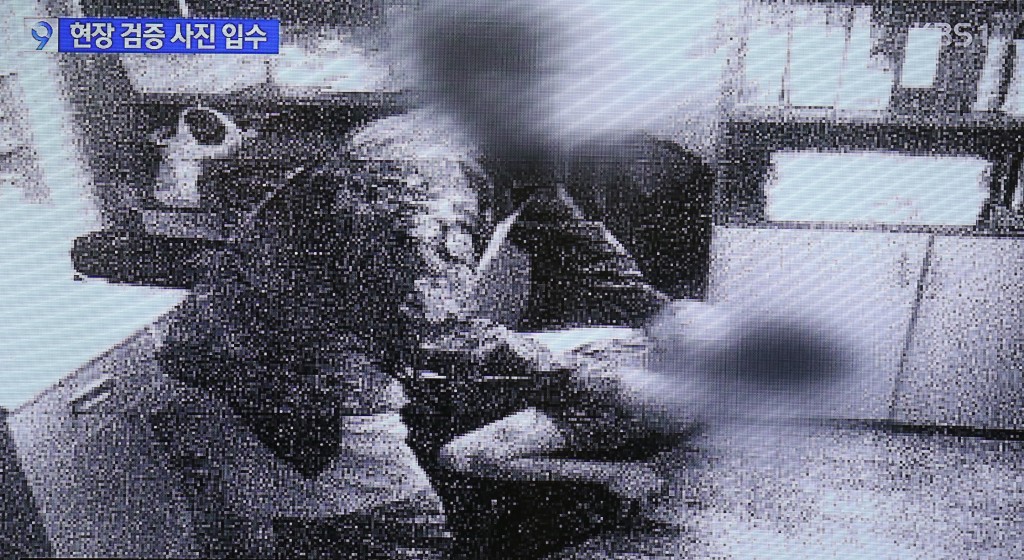- California Assembly OKs highest minimum wage in nation
- S. Korea unveils first graphic cigarette warnings
- US joins with South Korea, Japan in bid to deter North Korea
- LPGA golfer Chun In-gee finally back in action
- S. Korea won’t be top seed in final World Cup qualification round
- US men’s soccer misses 2nd straight Olympics
- US back on track in qualifying with 4-0 win over Guatemala
- High-intensity workout injuries spawn cottage industry
- CDC expands range of Zika mosquitoes into parts of Northeast
- Who knew? ‘The Walking Dead’ is helping families connect
Hazing deaths in Korea disturbingly unsurprising

This photo released by KBS television on Aug. 4, 2014, shows an Army solider re-enacting his assault on a fellow soldier at their barracks near the inter-Korean border in April 2014. The victim was beaten to death. (Yonhap)
By Kim Tong-hyung
An Army private, 23, is brutally beaten by his colleagues, put on an IV drip so he can recover to be beaten again, has his genitals coated with anti-inflammatory medicine, is forced to swallow a tube of toothpaste and prevented from sleeping at night during which he has to stay crouched. He inevitably collapses and dies.
Four schoolmates and three men lock a girl, 15, in a motel room, forcing her into prostitution. They beat her repeatedly, splash boiling water on her, and make her drink bowls of liquor and eat her own vomit. She inevitably collapses and dies. (Her attackers then burned her face with gasoline, poured cement over her body and discarded it in a suburban field.)
There is enormous anger over the two horrific hazing deaths, which continue to dominate headlines, social media conversations and political speeches.
However, the emotional outbursts and bureaucratic vows for quick fixes are an admission of our reluctance to ask harder questions: should we approach these deaths as isolated incidents or view them as symptoms of a deep cultural disease that we have allowed to take hold and which we so proudly defend?
How the young victims died was undeniably shocking. But their deaths were equally disturbing because they felt not so unusual.
Those who attacked the soldier and schoolgirl shared an alarmingly low level of basic human respect. It could be argued that this respect is first compromised at schools and further damaged at all levels of Korea’s highly hierarchical society, perhaps most dramatically in the military, where every able Korean male must serve for two years.
Obviously, not all Koreans grow up to be bullies or killers. But at varying levels, we are all victims of our own collective understanding of human rights that urgently needs a modern update.
Human rights principles are based on the theory of natural rights ― a person should be valued and treated as a human for no reason other than that he or she was born one.
This idea is quickly destroyed by the oppressive and violent teachers at many Korean schools. Ask any Korean adult about their school days and their memories about teachers will be quite similar.
“Humans are only humans if they are able to listen and follow instructions,” my third-grade elementary school teacher, who I have no wish to meet again, used to say. ”Those who cannot are no better than dogs or pigs.”
The problem with this sort of thinking is that it allows organizations ― whether they be schools, companies, military or government ― to define what is to act as human. These definitions will always vary by circumstance. Human rights are reduced to an idea that is conditional and relative.
It’s easy to imagine that many of those who have expressed anger at the deaths of the soldier and school girl are the same people who will humiliate younger colleagues at work for not adjusting to the office rules fast enough.
Cultural explanations are often a lazy cop-out when describing tragic events. But they are unavoidable for the recent hazing deaths as the culture at schools and barracks continues to be dysfunctional.
The revelation of the soldier’s death, which came to light after an activist group revealed the details of the case last week, came on the heels of a deadly shooting rampage that killed five at an Army unit close to the North Korean border in June.
The sergeant charged with the shooting spree has testified that he opened fired on his colleagues after being bullied by them for an extended period. This reminded the nation of another deadly incident in 2005 when a soldier, who said he was constantly bullied, attacked his colleagues with a grenade.
Perhaps, in relation to the size of its population, Korea has too big of an Army for the conscripted soldiers to be properly monitored and controlled. But forget about the military, which represents Korea’s most unyielding realm of bureaucracy, ever agreeing to move toward a smaller number of soldiers.
That said, Korea may have a better chance of reducing violence in the barracks than in classrooms where teachers continue to be a constant source of horror stories.
An Incheon high school teacher is facing punishment after spraying a can of bug repellent on a student’s face for leaving his seat last month. This was weeks after a 17-year-old high school student in Seoul was treated for a torn thigh muscle and internal organ damage after his math teacher forced him to sit up and down 800 times for undone homework.
In February, a high school student in Suncheon, South Jeolla Province, suffered brain death hours after a teacher smashed his head into a wall for being late.










![블랙핑크 로제(좌)와 제니(우) [로제 인스타그램·OA엔터테인먼트 제공. 재판매 및 DB 금지]](http://www.koreatimesus.com/wp-content/uploads/2025/04/AEN20250423001000315_02_i_P4-copy-199x223.jpg)




